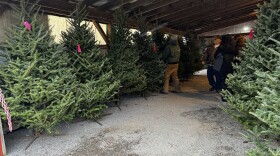Solar and wind power have gotten a lot of the attention as promising alternative power sources. But energy extracted from plants, known as biofuels, is also the subject of ongoing research.
Brian Richards, a researcher at Cornell, is testing one of those plants, a common weed known as switch grass, to see how it does in wet soils. Sixteen strips of grass serve as his lab on an otherwise barren, muddy field near the Ithaca airport.
Richards is part of a project called the Northeast Woody and Warm Season Biomass Energy Consortium, or NEWBio. Researchers at universities across the northeast are studying three crops – switch grass, miscanthus and willow – to prepare them for use in the biofuel industry.
Richards says he’s focused on identifying the right kind of marginal farmland for growing switch grass.
“You know, if you start trying to use prime farm lands then you’re competing for, you know, food and feed. So this avoids that fuel versus food competition, if we can use these successfully,” he said.
Biofuel production in the U.S. is starting to take off. According to government projections, biofuels have the potential to provide 30 percent of the country’s transportation fuels by the year 2030. In Rome, New York, there’s a pilot biofuel plant already in operation.
And according to NEWBio director Tom Richard, more companies will come to the Northeast to process biofuel once there’s enough crops available to them.
“It takes about three years to get up to peak production for those energy crops and that’s about the same time it takes to build a multi-hundred million dollar biorefinery," says Richard. "So if we don’t get those two things started at the same time, everybody’s waiting for the other thing and nothing ever happens.”
Eventually, if there’s enough of a profit for farmers, biofuel crops could also be mixed in with food crops.
Even though the idea of extracting gasoline from a plant is attractive, planting more crops for biofuel can have other consequences. At the Ithaca test field, researchers measure nitrous oxide and methane emissions. Richards says switch grass hasn’t been identified as an invasive species, but uncontrolled spread has been a problem with other popular plants.
“Marginal land is tough, there’s a reason it’s marginal, but we expected that,” he said.
Richards is in the second of five years of research on switch grass and his findings, along with all of NEWBio’s findings, will be shared with farmers interested in planting biofuel crops.
For more on this and other stories from the Innovation Trail, visit their website www.innovationtrail.org.
The Innovation Trail is a collaboration between six upstate New York public media outlets. The initiative, funded by the Corporation for Public Broadcasting (CPB), helps the public gain a better understanding of the connection between technological breakthroughs and the revitalization of the upstate New York economy.








